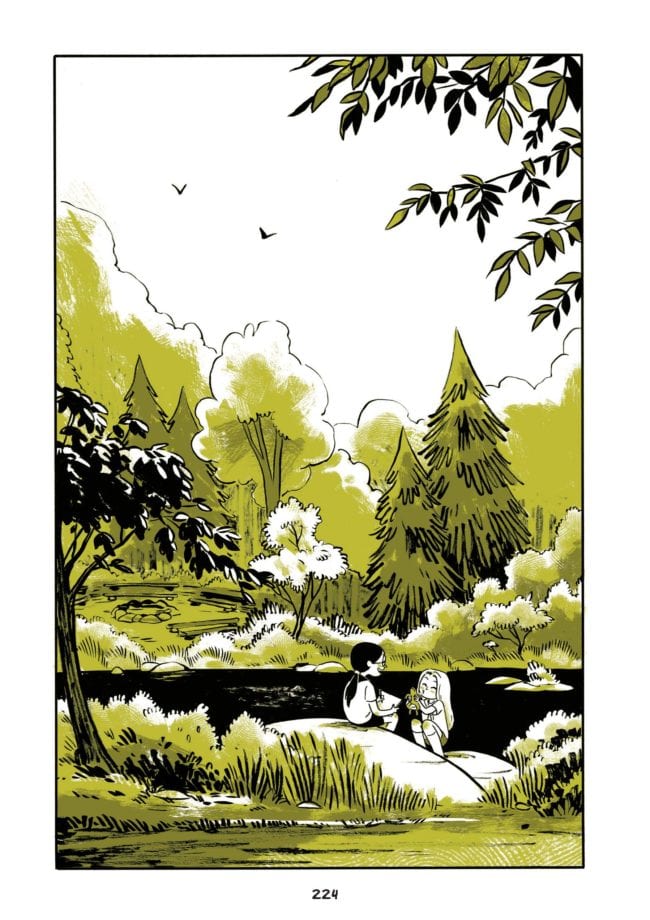It may be listed as being for Middle Grade and Young Teens, but Be Prepared will hit home with any adult who ever felt out of place growing up, which is to say, most of us. For Vera - as Brosgol explains in her Author’s Note, this is an autobiographical tale neatly fictionalized – that outsiderness stems from having moved to the United States from Russia at the age of five and not quite fitting in with all the other American kids. Funny, as foreign roots are very common in the melting pot of America, where everyone – or at least their forebears - hailed from somewhere else. Anyone with immigrant relatives will be familiar with observing cultural customs that never carried much past the walls of the family homes. You might think having this heritage-vs.-new-homeland dichotomy would be something to bond over but, people being people, this is almost never the case. Be Prepared shows this in spades. Some kids make friends easier than others, while lots more feel like the odd one out. But even if that’s true for so many, knowing this is hardly a comfort to the ones experiencing it. The first section of Be Prepared pulls on those heartstrings as Vera’s ninth birthday descends into disaster, her mother Russianizing every ingredient after Vera puts so much energy into planning the perfect American party. Vera’s pain is made all the more potent by her initial excitement. Brosgol does a great job here showing how harrowing such a thing is for a child while at the same time having us feel how much the mother is going through herself – a single parent, with three kids, studying for an accounting degree – while trying to scrape the money together to give her daughter what she thinks she wants. The scenes with her mother are few and far between but they do contain a great deal of information.
We then get to see more of her native country, “a little pocket of Russia, a familiar place in a strange land”, when the family goes to their Russian Orthodox church. With great economy, shown over a scant three pages, we get a strong sense of the seriousness and ritual of these proceedings. We also see that despite the comfort of the post-service snacks, socializing isn’t any easier here than elsewhere, with another girl simply getting up and leaving after Vera asks too many enthusiastic questions. Nice and subtly, we’ve now had our third panel referencing that Brosgol drew as a child, three times in thirty pages but always shown as a part of furthering the story, never explicitly pointing it out. It is now, drawing in the common room after the service, that Vera learns about the church’s Russian camp and thrills to the idea, as camp is somewhere all her American friends go during the summer.
 And thus begins the main story. Life at camp, away from Mom and the amenities of home, which is where Vera quickly realizes that what you think you want might, in reality, end up being nothing like what you’d expected. Rooming with two older girls who she very much wants to like her, Vera deals with questions of how to make friends and how to be yourself, while surrounded by juvenile power struggles and counselors who, annoyingly, just want to help. How you can still feel very alone whilst your common bond – exile and the Church – doesn’t account for much. And that kids – and people – are the same everywhere. This may sound serious but it’s a done with a lightness of touch, and there are many moments of humor throughout.
And thus begins the main story. Life at camp, away from Mom and the amenities of home, which is where Vera quickly realizes that what you think you want might, in reality, end up being nothing like what you’d expected. Rooming with two older girls who she very much wants to like her, Vera deals with questions of how to make friends and how to be yourself, while surrounded by juvenile power struggles and counselors who, annoyingly, just want to help. How you can still feel very alone whilst your common bond – exile and the Church – doesn’t account for much. And that kids – and people – are the same everywhere. This may sound serious but it’s a done with a lightness of touch, and there are many moments of humor throughout.
The title, Be Prepared, is of course the Scout’s Motto. And it should be pointed out that the choice of color scheme is very apt. Black, white, and olive. That shade of green being the perfect ‘outsider’ color, capturing the outdoors milieu as well as the feelings Vera experiences at camp. Brosgol renders all that nature, and the religious iconography, very well. One visual highlight is the double page spread in the midst of the campers’ hike. And despite all the character-building moments that Brosgol presents, it should be applauded that Be Prepared isn’t trying to teach any lessons. The young Vera isn’t shown to have changed by such trials, as any kid isn’t in the immediate future of such an experience. She’s simply elated that camp is over. And its final page points to what could be another book, continuing on with similar themes. It's one I would happily read.








